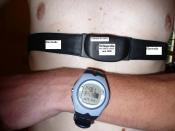The Effects of Caffeine on the Heart Rate of Daphnia This lab was designed to show how caffeine affected the heart rate of daphnia after exposing them to different concentrations of caffeine for ten minutes. Caffeine is a stimulant, which, in humans, causes heart rates and blood pressure to increase. Its effects range from mild alertness to heightened anxiety and body tension. We wanted to see if caffeine affected the daphnia's heart rate in the same way.
We filled three containers with three different concentrations of caffeine. The first container was our control with no caffeine, the second was filled with a .5% concentration of caffeine, and the third was filled with a 1% concentration of caffeine. Five daphnia were then placed in each container for ten minutes. After the daphnia were exposed to the concentrations for ten minutes, we used micropipettes to remove them from the solution and place them under a compound microscope.
While they were under the microscope, we counted their heartbeats for twenty seconds then multiplied the number by three. Each group of daphnia's heart rates was averaged to get a more accurate heart rate for each concentration.
Our hypothesis was that caffeine would increase the heart rate of the daphnia that were exposed to it. As seen on my graph, the control group of daphnia that was not exposed to any levels of caffeine had an average heart rate of 195.9 beats per minute, the group that was exposed to the .5% concentration of caffeine had an average heart rate of 185.5 beats per minute, and the group that was exposed to the 1% concentration of caffeine had an average heart rate of 217.5 beats per minute. As expected, the daphnia that were exposed to the 1% concentration of caffeine had a significant increase in...


